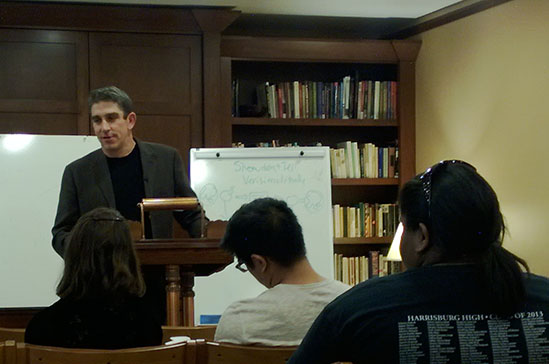“I’ve always been obsessed with the idea of home. Coming to America when I was 45 days old, a sense of place has always obsessed me. What’s my place at the table in America?”
Richard Blanco is the youngest, first Latino and first openly gay Presidential inaugural poet; he read his piece, “One Today,” at the 2013 inauguration ceremony of President Barack Obama. Blanco’s critically-acclaimed first book of poetry, City of a Hundred Fires, explores the yearnings and negotiation of a cultural identity as a Cuban American.
From September 15 to 17, Blanco visited Elizabethtown College to speak to classes, conduct workshops, and present to a diverse audience of campus and surrounding community members during an interview-style lecture opposite Jesse Waters, English Department lecturer and director of the Bowers Writers House.
“The negotiation was there,” Blanco said during this late morning lecture on September 17. “What is home?” Blanco wondered aloud. “What does that look like? Where am I going to end up?”
These questions, he said, are what consistently inspire his work as a multicultural poet. “They say a poet writes one poem all their lives,” he said. “Every single poem they write has some obsession.” His own obsession, he said, was defining “home,” and “finally having that place at the table and realizing that my story, all these stories, that is the American story – how we conceptualize what it means to be American.”
They say a poet writes one poem all their lives.”
Blanco was born in Madrid, Spain, on February 15, 1968, after his mother and other members of his family arrived as exiles from Cuba. A little over a month later, the family emigrated to New York City, then later moved to Miami, Fla. where Blanco was raised and educated within a close-knit Cuban community. “It was a very different childhood,” Blanco said. “I grew up into imaginary worlds. All of our community was Cuban. You’re not really from here, you’re from over there. American still felt like this place we were going to, someday, maybe.”
Blanco said his parents still conceptualized America in this fashion as well, and his childhood was full of romanticized images of America, including cowboy Western films translated into Spanish and Miss America pageants. It was “cultural purgatory,” as he put it.
Blanco’s parents encouraged him to study engineering because of his affinity for mathematics and the sciences, but his creative spirit had a habit of shining through. Despite earning his engineering degree from Florida International University in 1991, Blanco eventually returned to FIU—and his creative side– in 1997 to earn a Master of Fine Arts in creative writing under the mentorship of poet Campbell McGrath.
“Growing up a lower middle class son of immigrants, a working class family, the idea of a life in the arts was really outside my realm of possibility,” Blanco said. But as he delved into the realm of professional engineering, he quickly came to realize that much of his job as an engineer involved writing. He began, as he said, “discovering language in a way I’ve never done before.” He needed to be a good writer, he realized, in order to be a good engineer. “I never realized that language is engineered,” he said. Once he began to explore his creative passions, “I approached art not with apprehension but with a real sort of conviction.”
Making the transition from professional engineering to professional writing was almost seamless, Blanco said, because he’s never felt the need to sacrifice one for the other. “In some ways it’s brought me an incredible sense of balance,” he said. “In engineering, I designed physical landscapes. In poetry, I design emotional landscapes.”
When first exploring poetry seriously, Blanco explained, “I was looking for mirrors in which to look into, looking for the questions and then maybe the answers. It’s a little mysterious, but I think it opens up doors that reading a story might not, looking at a painting might not. Poetry goes right to the very core. I became attracted to that.”
Poetry serves as this proverbial campfire in which people can share stories and connect and share common human denominators.”
Blanco cited a moment during his youth when he first read William Carlos Williams’ “The Red Wheelbarrow” and knew for the first time what it meant to have an emotional experience with a piece of poetry. That experience, Blanco said, inspired his love of poetry and his compulsion to explore his creative capacities. “I just realized what poetry was,” he said of that moment. “The most ordinary things, the things that skip through our lives that we don’t even notice, the essential things. Poems are stories of the not-looked-for.”
Ultimately, Blanco explained, a poet is not just recreating the world, but they are putting the reader in touch with their own world. Ultimately, what a poet wants the poem to do is to become a mirror. It should compel the reader to respond to it, to feel and experience something within themselves. A poem, he said, is “the language of experience.”
Above all, during his talk at E-town, Blanco placed particular emphasis on a reader’s emotional, cultural, and spiritual connection with poetry, and the specific property of poetry that brings people from all backgrounds together. Poetry, he said, is “operating on those four-dimensional emotions that we all have. Poetry serves as this proverbial campfire in which people can share stories and connect and share common human denominators.”
Blanco’s first memoir is slated for publication in September 2014, and he continues to travel the world, to speak to audiences of all ages and cultural backgrounds, and to write poems that explore the complex inner workings of sexuality, cultural identity, gender identity, and the universal yearning for home.


